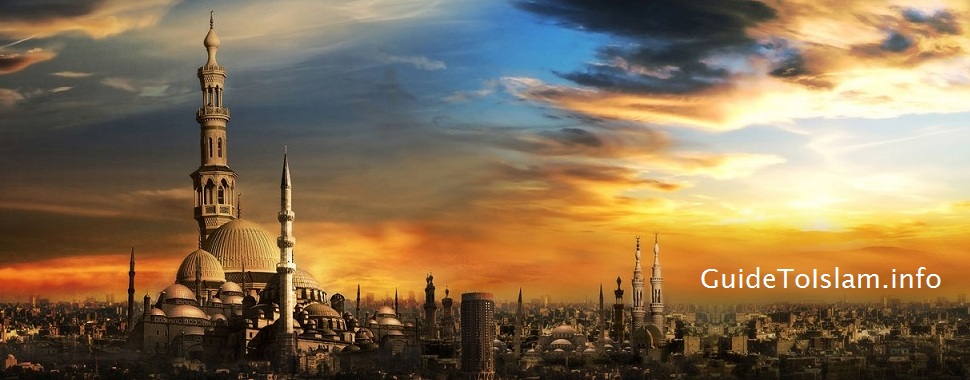Introduction
Dec 24, 2013 | Posted by GuideToIslam | Internet

For centuries the people of the Arabian Peninsula have possessed a strong identity based upon the tenets of Islam. Saudi Arabia is a modern nation that adheres to Islam, honors its Arab heritage and tradition, and presses vigorously forward in the service of Islam while securing the welfare of its people.
The Arabic word 'Islam' simply means 'submission', and derives from a word meaning 'peace'. In a religious context it means complete submission to the will of God. Therefore Islam means “submitting or surrendering one's will to the will of Allah. However submission to God does not entail self-humiliation or a denial of human intellect; rather, it means trusting the knowledge, wisdom, and fairness of the Creator.
Prophet Muhammad was born in Makkah in the year 570. Since his father died before his birth, and his mother shortly afterwards, he was raised by his uncle from the respected tribe of Quraysh. As he grew up, he became known for his truthfulness, generosity and sincerity, so that he was sought after for his ability to arbitrate in disputes. Prophet Muhammad was of a deeply religious nature, and had long detested the decadence of his society. It became his habit to meditate from time to time in the Cave of Hira near the summit of Jaba al-Nur, the 'Mountain of Light' near Makkah.
At the age of 40, while engaged in a meditative retreat, Prophet Muhammad received his first revelation from God through the Angel Gabriel. This revelation, which continued for twenty-three years, is known as the Qur'an.
As soon as he began to recite the words he heard from Gabriel, and to preach the truth which God had revealed to him, he and his small group of followers suffered bitter persecution which grew so fierce that in the year 622 God gave them the command to migrate from Makkah to Madina. This event, the Hijra, 'migration', in which they left Makkah for the city of Madinah some 260 miles to the north, marks the beginning of the Muslim calendar.
After several years, the Prophet and his followers were able to return to Makkah, and established Islam definitively in peace. Before the Prophet died at the age of 63, the greater part of Arabia was Muslim, and within a century of his death Islam had spread to Spain in the West and as far East as China.
The Five Pillars of Islam
Dec 24, 2013 | Posted by GuideToIslam | Internet

Islam has five primary obligations, or pillars of faith, that each Muslim must fulfill in his or her lifetime. The five pillars of Islam define the basic identity of Muslims - their faith, beliefs and practices - and bind together a worldwide community of believers into a fellowship of shared values and concerns. They are as follows:
1- Shahadah
The first pillar of Islam. Muslims bear witness to the oneness of God by reciting the creed "There is no God but God and Muhammad is the Messenger of God." This simple yet profound statement expresses a Muslim's complete acceptance of and total commitment to Islam.
2- Prayer
Prayer, is the second pillar. The Islamic faith is based on the belief that individuals have a direct relationship with God. The world's Muslims turn individually and collectively to Makkah, Islam's holiest city, to offer five daily prayers at dawn, noon, mid-afternoon, sunset and evening. In addition, Friday congregational service is also required. Although salah can he performed alone, it is meritorious to perform it with another or with a group. It is permissible to pray at home, at work, or even outdoors; however it is recommended that Muslims perform salah in a mosque.
3- Zakat
One of the most important principles of Islam is that all things belong to God, and that wealth is therefore held by human beings in trust. The word zakat means both 'purification' and 'growth'. Our possessions are purified by setting aside a proportion for those in need, and, like the pruning of plants, this cutting back balances and encourages new growth. Each Muslim calculates his or her own zakat individually. For most purposes this involves the payment each year of two and a half percent of one's capital.
A pious person may also give as much as he or she pleases as sadaqa, and does so preferably in secret. Although this word can be translated as 'voluntary charity' it has a wider meaning. The Prophet said 'even meeting your brother with a cheerful face is charity'.
The Prophet said: 'Charity is a necessity for every Muslim'. He was asked: 'What if a person has nothing?' The Prophet replied: 'He should work with his own hands for his benefit and then give something out of such earnings in charity'. The Companions asked: 'What if he is not able to work?' The Prophet said: 'He should help poor and needy persons.' The Companions further asked 'What is he cannot do even that?' The Prophet said 'He should urge others to do good'. The Companions said 'What if he lacks that also?' The Prophet said 'He should check himself from doing evil. That is also charity.
4- Fasting Ramadan
Every year in the month of Ramadan, all Muslims fast from sunrise until sunset, abstaining from food, drink, and sexual relations. Those who are sick, elderly, or on a journey, and women who are pregnant or nursing are permitted to break the fast and make up an equal number of days later in the year. If they are physically unable to do this, they must feed a needy person for every day missed. Children begin to fast (and to observe the prayer) from puberty, although many start earlier.
Although fasting is most beneficial to the health, it is regarded principally as a method of self-purification. By cutting oneself off from worldly comforts, even for a short time, a fasting person gains true sympathy with those who go hungry as well as growth in one's spiritual life.
5- Pilgrimage (Hajj)
The annual pilgrimage to Makkah—the Hajj—is an obligation only for those who are physically and financially able to perform it. Nevertheless, about two million people go to Makkah each year from every corner of the globe providing a unique opportunity for those
of different nations to meet one another. Although Makkah is always filled with visitors, the annual Hajj begins in the twelfth month of the Islamic year (which is lunar, not solar, so that Hajj and Ramadan fall sometimes in summer, sometimes in winter). Pilgrims wear special clothes: simple garments which strip away distinctions of class and culture, so that all stand equal before God.
The rites of the Hajj, which are of Abrahamic origin, include circling the Ka'abah seven times, and going seven times between the mountains of Safa and Marwa as did Hagar during her search for water. Then the pilgrims stand together on the wide plain of Arafa and join in prayers for God's forgiveness, in what is often thought of as a preview of the Last Judgement.
In previous centuries the Hajj was an arduous undertaking. Today, however, Saudi Arabia provides millions of people with water, modern transport, and the most up-to-date health facilities. The close of the Hajj is marked by a festival, the Eid al-Adha, which is celebrated with prayers and the exchange of gifts in Muslim communities everywhere. This, and the Eid al-Fitr, a feast-day commemorating the end of Ramadan, are the main festivals of the Muslim calendar.
Upcoming Topics
Related Links
- Quran Translation
Quran Translation (English) - Quran Word by Word
Quran Dictionary, Translation, Quranic grammar - Sunnah Library
Hadeeth Library (Bukhari, Muslim, Al-Nesa'i, Abi Dawoud, Al-Tarmasi, etc...) - Prayer Times & Qiblah
Prayer Times and Qiblah - Quran Audio
Quran Recitation
Recitation Apps
- To download the android app for Reciter Mishari Rashid Alafasy, scan the QR image below.

|

|

|
 |
- To download the android app for Reciter Abdul Baset Abdul Samad, scan the QR image below.

|

|

|
 |
Image Gallery






Contact Info
Address: Kansas City
E-mail: info@guidetoislam.info
Comments/Questions: Contact Us
The Holy Quran
The Holy Quran, is the last revealed Word of God, and the prime source of every Muslim's faith and practice. It deals with all the subjects which concern us as human beings: wisdom, doctrine, worship, and law, but its basic theme is the relationship between God and His creatures. At the same time it provides guidelines for a just society, proper human conduct and an equitable economic system. Learn more...
The Sunna
The Sunna, the practice and example of the Prophet, is the second authority for Muslims. A Hadith is a reliably transmitted report of what the Prophet said, did, or approved. Belief in the Sunna is part of the Islamic faith. Learn more...

